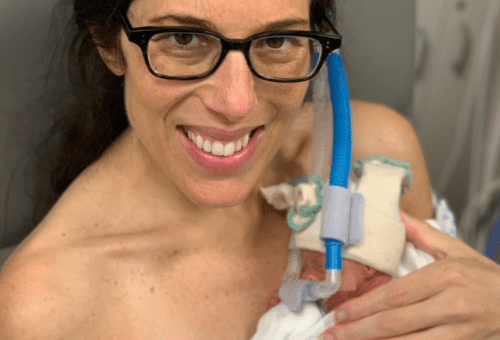
NEC – a complex (and all too common) condition . . .
More formally known as Necrotizing Enterocolitis, NEC is an intestinal disease that primarily affects premature and medically fragile infants. While research is still needed to fully understand why, when and how NEC occurs, we do know it causes an inflammatory process that can lead to intestinal tissue damage. To understand this disease, it may be helpful to consider the name itself:
Necrotizing: the process of tissue death
Enterocolitis: inflammation of the small intestine or colon.
In other words, Necrotizing Enterocolitis causes large sections of the intestines to rot and die.
A symptomatically unique and life threatening disease, Necrotizing Enterocolitis is unfortunately common in preterm babies. Still, most of us are unfamiliar with this complex intestinal condition. For many families, the first time they learn about NEC is when their premature baby suddenly becomes ill with a distended abdomen and episodes of apnea (failure to breathe) among other symptoms.
A tragic case of “if you know, you know” . . .
Every year in the US, thousands of babies develop NEC. While many babies recover fully from this complex condition, others face lifelong neurological and nutritional complications. Tragically, hundreds who develop NEC die.
Current research indicates that Necrotizing Enterocolitis is the most common cause of death in very premature infants after two weeks of age. Perhaps even more startling, NEC, according to the C.D.C., is still a leading cause of overall infant mortality in the United States. Today, prevention of this disease is a key element of care in neonatal intensive care units (NICUs) across the country. For this reason, over 80% of NICUs nationwide have human donor milk as the standard of care for very preterm babies if a mother’s own milk is not available.
And, while human donor milk has health benefits for a wide range of babies, our milk bank prioritizes distribution of donor milk to in-patient NICU patients before serving other families. Currently, Mothers’ Milk Bank Northeast proudly serves well over one hundred hospitals throughout eleven states.
Spreading awareness, inspiring change . . .
Today, May 17, is World NEC Awareness Day, a time when the world’s leading NEC charities come together to raise awareness and drive research. Dedicated to improving health outcomes for vulnerable infants, we’re sharing this article in the hopes of supporting their efforts.
Introducing The NEC Society . . .
One of our go-to resources, the NEC Society is a nonprofit organization dedicated to building a world without NEC through research, advocacy, and education. Launched by Jennifer Canvasser after her son died from complications of NEC just before his first birthday, this patient-led organization collaborates with expert clinicians and researchers to better understand, prevent, and treat this devastating disease.
The NEC Society’s work combines the patient-family perspective with solutions based on the best available scientific evidence. Boasting incredibly moving patient stories, educational resources and so much more, we’d highly recommend spending some time on their website. Before you rush off to do exactly that why not start with this excerpt . . .
9 things The NEC Society wants you to know about NEC . . .
NEC is the most common cause of death in hospitalized premature infants after two weeks of age. Babies born prematurely or with a complication, like congenital heart disease, are most at risk of NEC. In the US, thousands of babies develop NEC and hundreds of babies die every year from this complex intestinal condition.
Necrotizing Enterocolitis causes a severe inflammatory process that can lead to intestinal tissue damage and death. Once NEC is diagnosed, many babies only live for a few hours or days. Surgery for NEC is not curative and the babies who survive often have lifelong neurological and nutritional complications.
Mothers milk is one of the best ways to help prevent NEC in medically fragile babies. When mothers own milk is unavailable, human donor milk is the next safest option for babies at risk of NEC.
Formula does not protect against the risk of NEC in medically fragile babies.
For more, simply click here.









